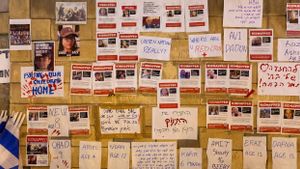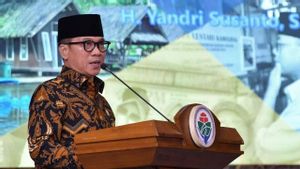JAKARTA - Chairman of the DPD RI AA LaNyalla Mahmud Mattalitti firmly rejected the proposal for the APBN to be a loan guarantee for the financing of the Jakarta Bandung high-speed rail project carried out by PT. KCIC (China's Indonesia Fast Train).
The construction of the Jakarta-Bandung high-speed train, which was initiated in the era of SOE Minister Rini Soemarno, continues to cause problems. Most recently, the Chinese government asked the Indonesian state budget to guarantee the payment of the project's debt.
Even the interest on the project debt turned out to be higher than the scheme in the initial proposal offered. Namely to 3.4 percent of the initial bid of 2 percent. Development costs also swelled, from initially US$6.071 billion to US$7.5 billion, or equivalent to Rp112.5 trillion (exchange rate of Rp15.000/US$).
"We still remember the initial scheme offered by China in the era of Minister Rini Soemarno. At that time, the reason Indonesia rejected the Japanese offer was because China did not ask for APBN guarantees, debts given at low interest of 2 percent fixed 40 years, and pure B2B financing," said DPD RI Chairman AA LaNyalla Mahmud Mattalitti in Surabaya, Thursday, April 13.
LaNyalla said, the project must be business to business (B2B). Because SOEs in the consortium act as business entities, not representing the government.
"So the Chinese government cannot ask for APBN guarantees. We must refuse. The DPD RI will provide notes to the DPR RI during the preparation of the 2024 State Budget Bill. Because it will definitely harm Indonesia's position," said LaNyalla, who is also the chairman of the advisory board of the East Java Chamber of Commerce and Industry.
Still according to AA LaNyalla Mahmud Mattalitti, he suspects that the Chinese government is asking for APBN guarantees because it has calculated that the manager of the Jakarta Bandung high-speed train, PT KCIC, will find it difficult to pay the principal debt and interest disbursed by the China Development Bank (CDB).
"Besides, this project is indeed strange, trains with a speed of 300 km per hour, but are used on short routes, Jakarta-Bandung with several stop stations. So it will be under optimal in terms of speed," concluded AA LaNyalla Mahmud Mattalitti who is also an alumni of engineering at Universitas Brawijaya Malang.
The English, Chinese, Japanese, Arabic, and French versions are automatically generated by the AI. So there may still be inaccuracies in translating, please always see Indonesian as our main language. (system supported by DigitalSiber.id)













